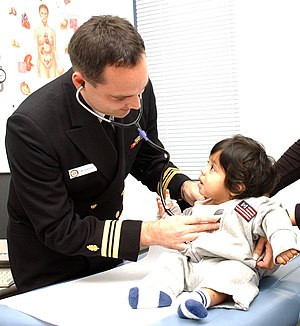Nurse practitioner

Family Nurse Practitioner Lt. Cmdr. Michael Service cares for a young girl at the U.S. Naval Hospital (USNH) Yokosuka.
|
|
| Occupation | |
|---|---|
|
Occupation type
|
healthcare professional |
|
Activity sectors
|
healthcare, advanced practice registered nurse |
| Description | |
|
Education required
|
Master's degree or doctorate. The American Association of Colleges of Nursing (AACN) recommends complete transition to the Doctor of Nursing Practice (DNP) by 2015. |
|
Related jobs
|
nurse midwife, nurse anesthetist, clinical nurse specialist |
Nurse practitioners are advanced practice registered nurses educated and trained to provide health promotion and maintenance through the diagnosis and treatment of acute illness and chronic condition. According to the International Council of Nurses, an advanced practice registered nurse (APRN) is "a registered nurse who has acquired the expert knowledge base, complex decision-making skills and clinical competencies for expanded practice, the characteristics of which are shaped by the context and/or country in which s/he is credentialed to practice. A master's degree is recommended for entry level."
Nurse practitioners (NPs) manage acute and chronic medical conditions, both physical and mental, through history and physical exam and the ordering of diagnostic tests and medical treatments. NPs are qualified to diagnose medical problems, order treatments, perform advanced procedures, prescribe medications, and make referrals for a wide range of acute and chronic medical conditions within their scope of practice. In addition to building upon and expanding their nursing knowledge and skills, the nurse practitioner also learns medicine and uses medical diagnoses and medical treatments in their practice. NPs work in hospitals, private offices, clinics, and nursing homes/long term care facilities. Some nurse practitioners contract out their services for private duty.
In the United States, depending upon the state in which they work, nurse practitioners may or may not be required to practice under the supervision of a physician. In consideration of the shortage of primary care/internal medicine physicians, many states are eliminating "collaborative practice" agreements and nurse practitioners are able to function independently. NPs—particularly in the area of primary care/internal medicine—fulfill a vital need for patient healthcare services, and the nurse practitioner works with physicians, medical/surgical specialists, pharmacists, physical therapists, social workers, occupational therapists, and other healthcare professionals to achieve the best outcomes for patients.
NPs may serve as a patient's primary healthcare provider and they may treat patients of all ages depending upon their specialty. With commensurate education and experience, nurse practitioners may specialize in areas such as cardiology, dermatology, oncology, pain management, surgical services, orthopedics, women's health, and other specialties. Similar to all healthcare professions, the core philosophy of the nurse practitioner role is individualized care that focuses on a patient's medical issues as well as the effects of illness on the life of a patient and his or her family. NPs tend to concentrate on a holistic approach to patient care, and they emphasize health promotion, patient education/counseling, and disease prevention. The main classifications of nurse practitioners are: adult (ANP); acute care (ACNP); gerontological (GNP); family (FNP); pediatric (PNP); neonatal (NNP); and psychiatric-mental health (PMHNP). Adult-gerontology primary care nurse practitioner (AGPCNP) is a classification that has recently evolved.
...
Wikipedia
